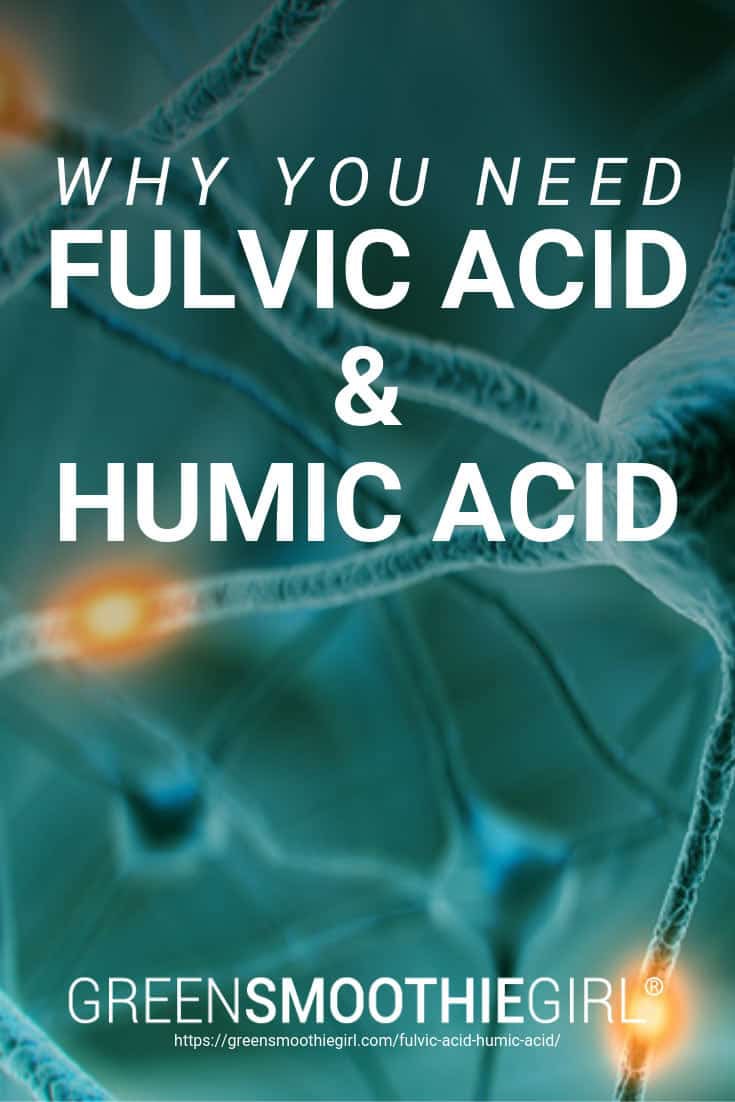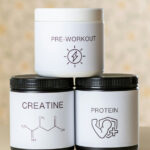Why Almost Everyone Needs Minerals DAILY for Better Nutrition, Energy, Immunity, and More

Even the healthiest foods are depleted of minerals and not nearly as nutrient-dense as they should be.
And, you still might be deficient in a dozen or more nutritional compounds, even if you've been eating a mostly organic, plant-based diet.
Where are those missing nutrients? They are in plant foods grown in the black, rich soil of fields that lie fallow every few years and are home to decomposing organic plant matter, rather than chemicals.
What can you do to get those nutrients? Luckily, you can add what wasn't in the soil your fruits and veggies were grown in.
These black-earth compounds, missing in most soils, are called fulvic and humic acids. And when you add them to your diet, you'll plug many leaks in your nutrition.
[Our Biggest Deal of the Year on our bestselling Ultimate Minerals is here. These are the minerals your body needs, from plants, in a way your body can actually use, unlike most other mineral products. Save up to 25%, this month only!]
In this post:
- What Is Fulvic Acid?
- How Fulvic Acid Works in the Body
- Health Benefits of Fulvic Acid
- What Is Humic Acid?
- Humic Acid Health Benefits
- How Can You Get More Fulvic and Humic Acid Into Your Diet?
- Supplementing with Fulvic Acid and Humic Acid
- TLDR: Fulvic Acid and Humic Acid
While “fulvic acid” and “humic acid” might sound like something from a chemistry set, these nutrient- and mineral-rich compounds are the source of vital nutrients, vitamins, and trace minerals in every fruit or vegetable you’ve ever eaten.
So, what’s the problem? Because of mass commercial agriculture and strip farming that depletes the soil, the plants we eat are missing out on important nutrients and minerals — and so are we.
There’s a mountain of evidence that supplementing with humic and fulvic acid can have a big positive impact on your health, in avoiding illness, improving your energy and sleep, and growing thick and strong hair and nails, among many other benefits.1

Modern farming methods strip fulvic and humic acid from soils, and consequently from our food.
What Is Fulvic Acid?
Fulvic acid1 (sometimes confused with folic acid) is a byproduct of decomposing plant life in a unique type of soil called humus.
This organic compound is the smallest of a class of complex molecules called humic acids, which are vital to growing healthy, nutrient-rich crops.2
The millions of microbes found in fulvic acid protect and nourish plant roots, extracting, transforming, and delivering bioavailable nutrients from the soil to the plant.
When we eat plants rich in fulvic acid, we reap the benefits of the vitamins, nutrients, and minerals that have bonded with fulvic acid’s small molecule size.
These small molecules can easily cross our cell membranes, delivering the nutrients to our body’s cells in a water-soluble format they recognize and can easily use.
How Fulvic Acid Works in the Body
The unique molecular structure of fulvic acid means it’s able to deliver vital nutrients, vitamins, and organic trace minerals in a way no lab-made supplement ever could.
Why? Let’s break it down:
Small Molecule Size
Most supplements you’ll find on the pharmacy shelf have large molecules. Sure, they can float around in the bloodstream, but crossing the cell membrane is a different matter.
Fulvic acid, on the other hand, is the smallest of all the humic acids, and it's just the right size to pass through the cell membrane (bonded with cell-nourishing nutrients, minerals, or vitamins).
Carrying Capacity
Fulvic acid is a powerhouse when it comes to transporting key nutrients and minerals into our body’s cells.3
A single molecule of fulvic acid can transport about 60x its weight in nutrients. That’s a lot of beneficial cargo, delivered straight into cells!
Ionic Function
The fulvic molecule has the unique ability to donate or receive two electrons, making it a powerful natural electrolyte, chelator, and antioxidant.
This ability means that fulvic can interact with any substance it comes in contact with, creating new compounds the body can use more readily or rendering harmful compounds inert so they can be safely flushed out of the body (more on those functions later!).
Another benefit of this ionic function is that fulvic uses its electrical charge to signal the membranes of cells to become permeable, essentially “opening the gates” of the cell to accept fulvic, along with its payload of nutrients.
Health Benefits of Fulvic Acid
Fulvic acid has been used in Ayurvedic medicine for thousands of years in the form of shilajit (a tar-like substance found in the Himalayan mountains that’s high in fulvic acid).4
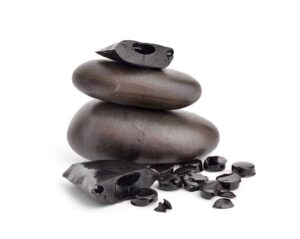
Shilajit is a source of fulvic acid and has been used for thousands of years as a disease prevention tool.
Modern science confirms that the potential health benefits of fulvic acid are pretty much endless.4
How? It all comes down to the unique molecular structure we talked about earlier, plus a plentitude of bioavailable, ionic minerals.
Every single metabolic activity of the body depends on minerals.
Addressing your deficiencies in the most bio-available way possible is one of the single most powerful things you can do for your health, so powerful and important that, ever since I discovered fulvic and humic acids 10 years ago, I never leave home without them, not even for a one-night trip.
It is my #1 must-have, never-miss supplement I will take, forever.
1. Plentiful, Balanced Trace Minerals
Fulvic acid is one of the richest balanced sources of trace minerals, vitamins, and nutrients on the planet (think upwards of 75 different types, depending on the source).
And while multivitamins try to mimic this bounty of trace minerals, vitamins, and nutrients, fulvic acid has the advantage, thanks to bioavailability and ionic molecules.
2. Bioavailable, Ionic Minerals
Without minerals, our bodies would literally shut down.
Every function and every organ in the human body requires minerals to generate energy. Unfortunately, you can’t just plop a bunch of iron or calcium into your system.
That’s where fulvic acid comes in: Like it does in plants, fulvic acid transforms colloidal minerals (stable minerals with large molecules and no electrical charge) into ionized minerals (minerals with an electrical charge) that can easily penetrate cell membranes.
3. Boosts Immunity and Fights Bacterial and Viral Infections
Several important studies show that fulvic acid can help boost the immune system, rapidly improving illness caused by bacteria and viruses.
One recent study showed that taking humic and fulvic acid can actually speed up healing from the common cold.10
Impressed? Fulvic acid also shows promise in fighting the polio virus,11 herpes, influenza A, and Coxsackie A9 virus.12
Fulvic acid has also been shown to be effective at neutralizing candida overgrowth.13 This is especially significant, since not only is candida overgrowth an underlying cause of many other ailments, but candida is notoriously resistant to treatment.
4. Free-Radical Destroying Super Antioxidant
Because fulvic acid can either donate or accept an electron, it’s an incredibly effective antioxidant. What does that mean?
Think back to high school chemistry with me for a moment: The electrons in stable atoms come in pairs. But when an atom is damaged and loses an electron, it becomes unstable and begins looking for other electrons to pair with — causing damage throughout the body as it does so.
Antioxidants like fulvic acid aggressively scavenge for these free radicals, then neutralize them by supplying the needed positive or negative charge.
Because of fulvic acid’s antioxidant power, it can help improve chronic pain/inflammation and even fight cancer.
5. Improves Chronic Pain and Inflammation
Several studies7 have shown that fulvic acid reduces inflammation and chronic pain4 in large part because of its ability to fight free radicals.
The epidemic we’re seeing in inflammatory and autoimmune diseases in modern society isn’t a coincidence.
Our bodies are dealing with a near-constant onslaught of imbalanced free radicals (highly reactive byproducts that result from exposure to pollution, processed foods, smoking, UV damage, etc.). Part of the reason for this is the fact that most of us are low in a number of minerals!
Left unchecked, those free radicals wreak havoc on our cells and organs, leading to inflammation and chronic pain.

Fulvic acid can help with chronic pain and inflammation.
That’s where fulvic acid comes into play. Fulvic acid helps neutralize these free radicals, helping your body restore balance and reduce inflammation and pain.
6. Fights Cancer
Several groundbreaking studies have shown just how much potential fulvic has in slowing tumor growth and eliminating precancerous or cancerous cells.
In one study, for example, researchers found that when three different different types of cancer cells were exposed to fulvic acid, the fulvic acid stopped or slowed the cancer cells from multiplying8 in all three cases, as well as increasing activation of the apoptotic genes in the cancer cells (the genes that instruct the damaged cells to die off).
7. Binds with Heavy Metals and Toxins
Fulvic acid is a natural chelator. Because of its molecular structure, it bonds naturally to heavy metals, including lead.6 I
In the case of toxic metals our body doesn’t want to absorb (like lead and cadmium), fulvic acid helps neutralize then flush the heavy metals out of our body before they can be tucked away into our tissues or damage our organs.
8. Improves Brain Health and Function
Emerging research shows that fulvic acid may hold important keys to optimizing brain function, as well as treating many of the conditions and diseases that afflict the human brain.
A 2011 study showed that fulvic acid offered a great deal of promise for patients with Alzheimer’s5 because of its unique ability to keep plaques and protein tangles (believed to be the root cause of Alzheimer’s) from forming, as well as its antioxidant properties.
9. Boosts Libido
Fulvic acid has long been known in traditional medicine as a natural aphrodisiac.
A groundbreaking, double-blind study9 of men aged 45-55 showed that men who took shilajit (a tar-like substance found in the Himalayas, and one of the highest sources of fulvic acid) saw significant increases in testosterone levels (19 percent!), compared with a placebo group.
For both men and women, fulvic and humic acid can help maintain hormone balance and sexual wellness by protecting the cellular health of reproductive organs, maintaining proper body pH, and improving blood circulation (more on all this below!).
10. Cleanses the Blood and Improves Circulation and Energy
Initial studies show that fulvic and humic acids can improve circulation and boost the health of your blood cells.10
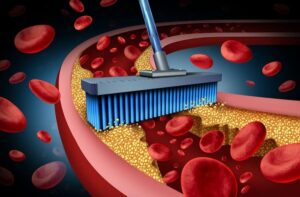
Poor blood circulation can be improved with fulvic and humic acid supplements.
Fulvic acid is a blood oxygenator that helps blood cells better transport and circulate oxygen throughout the body. This improved circulation of oxygen throughout the body allows for better waste removal, more efficient energy production, and lower blood pressure.
11. Keeps Your Heart Strong
The human body was made to get the bulk of its nutrition from plants.
It makes sense then, that the most bioavailable heart-healthy organic trace minerals, such as selenium, copper, chromium, potassium, and magnesium, are found in plants via humic and fulvic acid.
Most heart problems (like heart disease) are caused by inflammation from a poor diet and lack of these vital trace minerals.
Supplementing with fulvic acid can lower inflammation in your cardiovascular tissue4 and help ensure your heart gets the nutrients and organic, ionic minerals it needs to stay disease-free.
12. Improves Eczema and Other Skin Problems
Because fulvic acid has anti-inflammatory, anti-viral, and antibacterial properties, it’s also a promising treatment for eczema and other skin problems like rashes, bug bites, reactions to poisonous plants, and fungal conditions like athlete’s foot.
One recent study revealed that fulvic acid may be just as effective as prescription eczema treatments14 (minus some of the negative side effects)!
13. Improves Body pH
The name “fulvic acid” is a little misleading. Why? Because this organic compound is soluble at any pH, it can actually be highly alkaline-forming in an overly acidic environment.
This is extremely important given how many of us have an overly acidic body pH caused by processed and sugary foods, endocrine disruptors and toxic chemicals in our environment, and a lack of living foods in our diet.
In an overly acidic body, cells struggle to grow, multiply, and detox properly. Supplementing with fulvic acid can improve pH levels in the body, which in turn allows for normal cell metabolism and organ function.
14. Increases Collagen and Slows Signs of Aging
What’s one of the biggest reasons you end up with wrinkles, age spots, and a generally older appearance? The answer isn’t just “your age.” Not in terms of a number, anyway.
The wear and tear on your skin (and other organs) is a direct result of how well your cells can regenerate and repair damage, as well as the presence or absence of free radicals, and the nutrients available to them.15 It’s one of the reasons some 40-year-olds look 30 — while others look 50.

Fulvic acid helps promote healthy skin cell regeneration.
Fulvic acid neutralizes free radicals4 that come from UV damage and pollution, and helps your cells to properly use and metabolize key nutrients (like vitamin C, which helps you make collagen).
[Related: 7 Key Nutrition Factors for Youthful Beauty You Will Love]
15. Helps the Gut Heal and Function Properly
Humic acids like fulvic are cornucopias of good bacteria, or probiotics, that improve the health and diversity of your microbiome, as well as actually repairing an inflamed or “leaky” digestive tract (which can trigger autoimmune conditions as food particles escape and trigger an immune response).
One study found that participants taking humic and fulvic acid increased the number of healthy bacteria in their microbiome16 by 10% over just 20 days.
Why else is an infusion of probiotics good for your health?
Well, those little microbes are the powerhouses that turn your food into energy, create short-chain fatty acids that directly impact the quantity and quality of hormones like dopamine and serotonin,17 manage your stress level, and keep harmful bacteria (like candida) from getting a foothold.
16. Helps with Weight Management and Metabolism
In the same vein of gut health, fulvic and humic acid can help you digest and metabolize your food more effectively, cutting down on spikes in blood sugar, improving nutrient absorption, and helping you maintain a healthy weight.
Fulvic acid actually helps your body process simple sugars in a new way. Instead of converting simple sugars into fat deposits, fulvic acid helps the mitochondria in your cells quickly convert the simple sugars to ATP/energy.
One study found that fulvic acid made a significant difference in improving lipid profiles and lowering blood glucose.18 That’s fantastic news for people who are overweight, diabetic, pre-diabetic, or struggle with metabolic disorder.
17. Improves Digestion
Your body relies on enzymes to trigger chemical reactions for proper digestion. However, for enzymes to work properly, they need coenzymes, meaning nutrients and minerals.
Think of enzymes as the guns while nutrients and minerals are the bullets. Both work hand in hand together to regulate chemical processes like digestion. Fulvic acid supplies plenty of high-quality nutrient bullets for your enzymes to use in regulating digestion.
I have perfect digestion while it seems everyone around me, my age and even younger, has major digestive issues, and I have to wonder if my consistent supplementation with organic fulvic and humic is why!
18. Improves Vitality, Energy, and Endurance
Did you know that the organizations Doctors Across Borders and Doctors Beyond Medicine use fulvic and humic acid to help people in dire medical conditions who may not have ongoing access to health care?
That’s because fulvic acid helps recharge the mitochondria in every cell in the body, offering up electrons as needed for electrolyte balance, hydration, and cell metabolism.
People who regularly supplement with fulvic acid notice improvements in overall vitality, endurance, and energy — no coffee needed. In fact, in the former USSR, fulvic acid was secretly used by Olympic athletes and military for a competitive edge19 in healing injuries and endurance.

Fulvic acid oxygenates and cleans blood cells, for better energy and endurance.
19. Supports the Endocrine System
Fulvic and humic acid support a healthy endocrine system by protecting reproductive and hormone-producing organs (like the liver, ovaries, and thyroid) from free radicals, flushing endocrine-disrupting heavy metals like lead, allowing endocrine organ cells to readily use and absorb the nutrients they need, and encouraging damaged cells to regenerate.
One study found that hens who had been poisoned by lead (one of the most destructive heavy metals capable of damaging the thyroid) were able to recover thyroid function with humic acid.20
20. Improved Sleep
Minerals are hormone modulators, which means they help control the proper ebb and flow of hormone release and production in your body. This translates to better sleep, since hormones determine the health of our circadian rhythms.
This health benefit is the other side of the coin to that enhanced energy and vitality during waking hours: healthy circadian rhythms mean that you’ll feel more awake during the day, and sleep more soundly at night.
What Is Humic Acid?
Humic acid is an organic compound that’s formed from the decay of prehistoric plant life (think 80 million years old), through a process called “humification.” Fulvic acid is a byproduct of this substance.
Humic acid was originally buried deep inside the earth, in layers called “Leonardite,” or compressed organic matter that hasn’t formed into coal.
To be clear, humic acid ISN’T a fertilizer. It’s something called a “bio-catalyst” that conditions the soil and allows the plant to absorb nutrients and minerals more easily.
Humic Acid Health Benefits
Humic acid acts as a cleansing, fortifying, nourishing, and detoxifying agent in the human body.
Antimicrobial and Antifungal Properties
Candida and other fungal infections can be extremely resistant to antibiotics and antifungal drugs, and they proliferate inside the body quickly.
Humic acid helps eradicate candida and other harmful microbes,13 by disrupting the microbes’ ability to protect themselves, slowing replication and reducing inflammation that gives candida and other microbes a stronger foothold.
Supports a Healthy Microbiome
Humic acid provides both fuel and shelter for the vital microbes in your gut. Humic’s function as a fiber-like prebiotic nourishes these microbes, while its large size also offers a shelter that’s perfect for reproducing and multiplying.
Supports Digestive Enzymes
The microbes in your gut play a vital role in helping digestive enzymes turn your food into energy. Diversifying and fortifying your gut bacteria with the probiotics found in humic acid results in the production of more short-chain fatty acids that your digestive enzymes can use to trigger and regulate digestive processes.
Related Post: Do You Really Need Prebiotics?
Cleansing Agent
Humic acid provides a crucial fiber-like function, helping cleanse and detoxify your gut lining and digestive tract, its large molecule size acting as a broom that sweeps out waste and debris.
How Can You Get More Fulvic and Humic Acid Into Your Diet?
Most of us could use more fulvic and humic acid in our diets.
Why? I know you might be thinking, “I already eat a diet rich in whole foods, raw fruits, and vegetables. I don't really need to supplement with humic and fulvic acid.”

Fulvic and humic acid transform inorganic minerals into ionized minerals the body can better use.
And if we lived a century or two earlier, you’d be right. But with modern agricultural strip farming that aims for massive crop yields and depletes the soil of vital nutrients3 (then adds those required nutrients back into the soil via toxic fertilizers), the plants we eat today are different from the plants our great grandparents ate. Even people who eat 60-80% raw fruits and veggies can need supplementation.
A high quality fulvic and humic acid supplement delivers a concentrated dose of the nutrients that should be plentiful in the food we eat but, in many cases, aren’t.
Supplementing with Fulvic Acid and Humic Acid
If you choose to supplement with fulvic and humic acid, keep the following tips in mind to make the most of this dietary powerhouse:
Choose a High-Quality Supplement with Both Humic Acid and Fulvic Acid
Like anything else, you’re going to want to be choosy with your fulvic and humic acid supplement. For one thing, opt for a complete fulvic acid supplement, i.e., one that includes humic acid.
While many supplements focus solely on fulvic acid, a combination of fulvic AND humic acid together creates a more complete package and offers some unique benefits that can’t be found from taking fulvic acid alone.
Fulvic and humic acid are naturally found together in nature; after all, fulvic acid is a byproduct of humic acid. By taking a complete supplement, you’ll get the full benefits of fulvic acid’s bioavailable nutrients, minerals, and antioxidant properties, as well as humic acid’s detoxifying and cleansing properties.
You should also make sure the supplement you choose is highly concentrated, free of fillers and preservatives, and is tested for heavy metals.
Use Filtered Water
The quality of the water you drink can have a significant impact on how well fulvic and humic acid interact with your body.
Filtered water is important because fulvic and humic acids can react with chlorine in treated water. Chlorine is toxic to all living cells, and degrades fulvic and humic into unuseable compounds.21
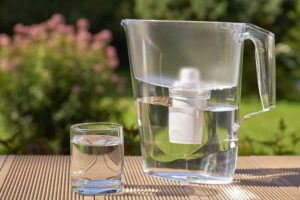
Take fulvic and humic with filtered water, never chlorinated water.
But then, while filtered water has removed all the chlorine, it has also removed all the naturally occurring minerals, as well. That’s why I like to add a concentrated organic fulvic/humic compound to my water, morning and night.
Titrate Up
Fulvic and humic acid are, by design, potent! Fewer than 1 percent may experience gastrointestinal distress (mild cramping, gas, bloating) when first adding humic and fulvic acid to the diet as the body cleanses itself.
Start with half the recommended dose and work your way up to the full dose, little by little over a couple of weeks, to give your digestive system a chance to adjust.
TLDR: Fulvic Acid and Humic Acid
The phrase “a little dirt won’t hurt you,” couldn’t be more true. The deposits of ancient plant life deep within our soil — known as humic and fulvic acid — are the key to creating vitamin- and nutrient-dense fruits and vegetables that fuel our bodies.
Unfortunately, mass production of crops, failure to re-incorporate humus into the soil, and reliance on chemical fertilizers has made it increasingly difficult to get all the nutrients, trace minerals, and vitamins from the plants we eat. In other words, even people who eat a healthy, plant-based, mostly raw diet may still be deficient in many important vitamins and minerals.
Supplementing with fulvic and humic acid can have a big impact on your health by providing desperately needed vitamins and minerals in a form your body recognizes, improving cell health and metabolism, and fighting inflammation and harmful bacteria throughout the body while supplying an influx of good bacteria to the gut.
Read Next: What Causes Brain Fog? Clear the Haze and Get Your Life Back

Disclosure: This post may contain affiliate links that help support the GSG mission without costing you extra. I recommend only companies and products that I use myself.

Sources
- Schepetkin IA, Xie G, Jutila MA, Quinn MT. Complement-fixing activity of fulvic acid from Shilajit and other natural sources. Phytother Res. 2009;23(3):373–384. doi:10.1002/ptr.2635
- Zang Y, Wei X, Hao M. Long-Term Effect of Crop Rotation and Fertilisation on Bioavailability and Fractionation of Copper in Soil on the Loess Plateau in Northwest China. PLoS One. 2015;10(12):e0145370. Published 2015 Dec 22. doi:10.1371/journal.pone.0145370
- M. Schnitzer, H. Kodama. An electron microscopic examination of fulvic acid. Geoderma. https://doi.org/10.1016/0016-7061(75)90041-5
- Winkler J, Ghosh S. Therapeutic Potential of Fulvic Acid in Chronic Inflammatory Diseases and Diabetes. J Diabetes Res. 2018;2018:5391014. Published 2018 Sep 10. doi:10.1155/2018/5391014
- Cornejo, Alberto et. al. “Fulvic acid inhibits aggregation and promotes disassembly of tau fibrils associated with Alzheimer's disease.” J Alzheimers Dis. 2011; 27(1): 143–153. doi: 10.3233/JAD-2011-110623
- Vašková J, Krempaská K, Žatko D, Mudroň P, Glinská G, Vaško L. “Effects of Humic Acids in Chronic Lead Poisoning.” Biol Trace Elem Res. 2019 Jan;187(1):230-242
- Sabi, R., Vrey, P., and Van Rensburg, C. E. (2012). Carbohydrate-derived fulvic acid (CHD-FA) inhibits carrageenan-induced inflammation and enhances wound healing: efficacy and toxicity study in rats. Drug Dev. Res. 73, 18–23. doi: 10.1002/ddr.20445
- Yuan, Shenyuan; Fulvic Acid, 4 1988; in Application of Fulvic acid and its derivatives in the fields of agriculture and medicine; First Edition: June 1993.
- Pandit S, Biswas S, Jana U, De RK, Mukhopadhyay SC, Biswas TK. Clinical evaluation of purified Shilajit on testosterone levels in healthy volunteers. Andrologia. 2016;48(5):570–5.
- Yinzhang Cui, Humic Acid, 1 (1991)
- Sobsey MD, Hickey AR. Effects of humic and fulvic acids on poliovirus concentration from water by microporous filtration. Appl Environ Microbiol. 1985;49(2):259–264.
- Haynes, Antony BA, RNT. “Review of Humid Acid.” Clinical Education. May, 2016.
- Borghi E, Morace G, Borgo F, et al. New strategic insights into managing fungal biofilms. Front Microbiol. 2015;6:1077. Published 2015 Oct 6. doi:10.3389/fmicb.2015.01077
- Gandy JJ, Snyman JR, van Rensburg CE. Randomized, parallel-group, double-blind, controlled study to evaluate the efficacy and safety of carbohydrate-derived fulvic acid in topical treatment of eczema. Clin Cosmet Investig Dermatol. 2011;4:145–148. doi:10.2147/CCID.S23110
- Jylhävä J, Pedersen NL, Hägg S. Biological Age Predictors. EBioMedicine. 2017;21:29–36. doi:10.1016/j.ebiom.2017.03.046
- Swidsinski A, Dörffel Y, Loening-Baucke V, et al. Impact of humic acids on the colonic microbiome in healthy volunteers. World J Gastroenterol. 2017;23(5):885–890. doi:10.3748/wjg.v23.i5.885
- Ridaura V, Belkaid Y. Gut microbiota: the link to your second brain. Cell (2015) 161:193–4. 10.1016/j.cell.2015.03.033
- Trivedi NA, Mazumdar B, Bhatt JD, Hemavathi KG. Effect of Shilajit on blood glucose and lipid profile in alloxan induced diabetic rats. Indian J Pharmacol. 2004;36:373–6.
- Keller JL, Housh TJ, Hill EC, Smith CM, Schmidt RJ, Johnson GO. The effects of Shilajit supplementation on fatigue-induced decreases in muscular strength and serum hydroxyproline levels. J Int Soc Sports Nutr. 2019;16(1):3. Published 2019 Feb 6. doi:10.1186/s12970-019-0270-2
- Sahin, A, Iskender, H, Terim, Kapakin KA, Altinkaynak, K, Hayirli, A, Gonultas, A, & Kaynar, O. (2016). The Effect of Humic Acid Substances on the Thyroid Function and Structure in Lead Poisoning. Brazilian Journal of Poultry Science, 18(4), 649-654.
- Al-Abri, Mohammed, et al. "Chlorination disadvantages and alternative routes for biofouling control in reverse osmosis desalination." npj Clean Water 2.1 (2019): 2.
Posted in: Natural Remedies, Reviews, Supplements, Whole Food




